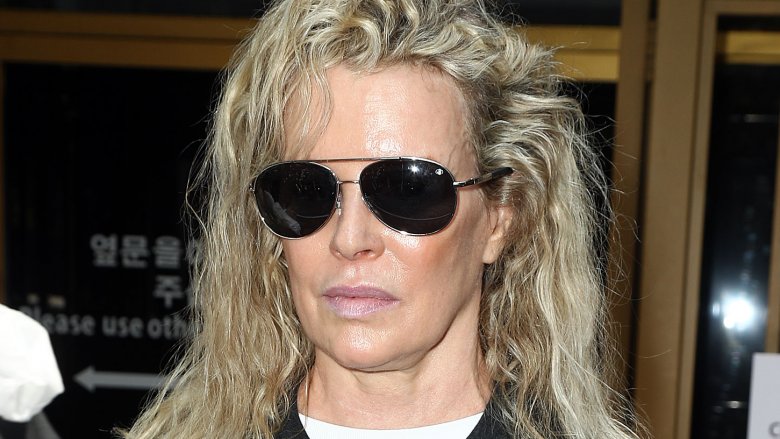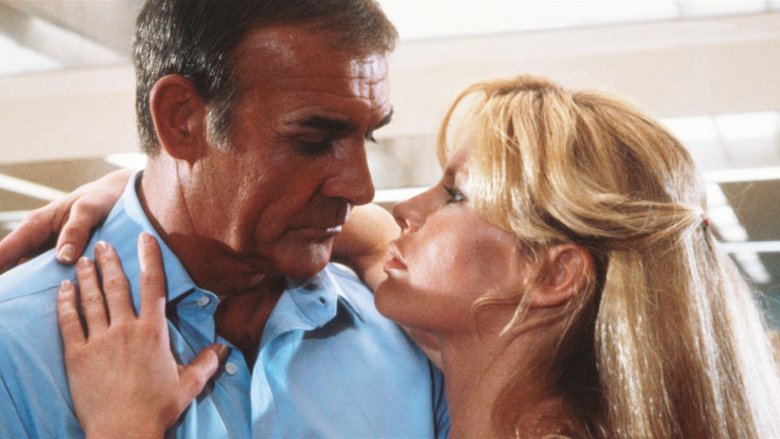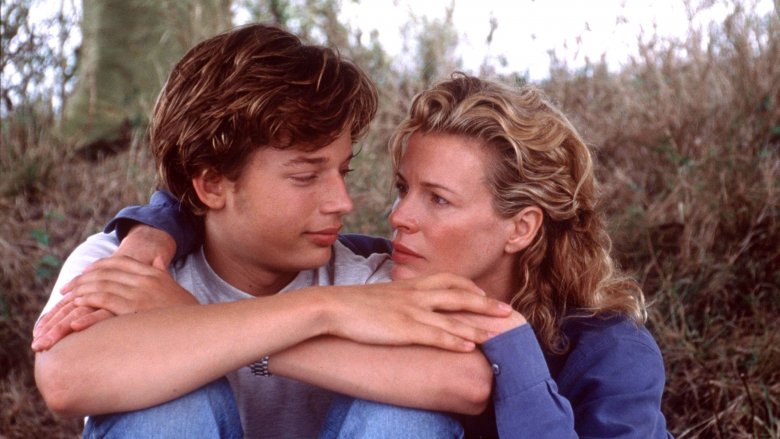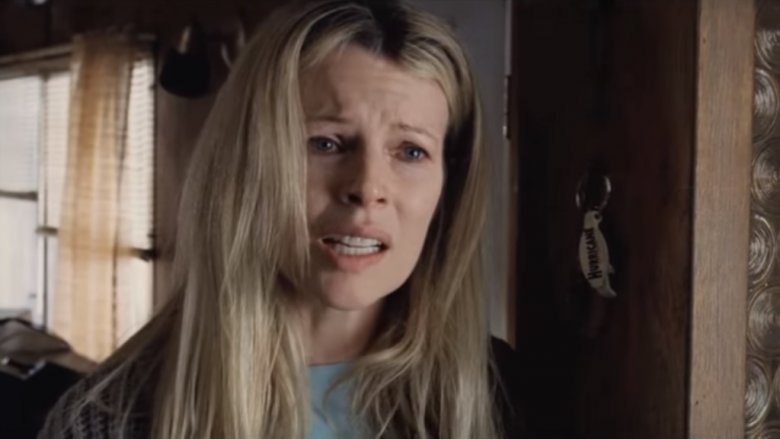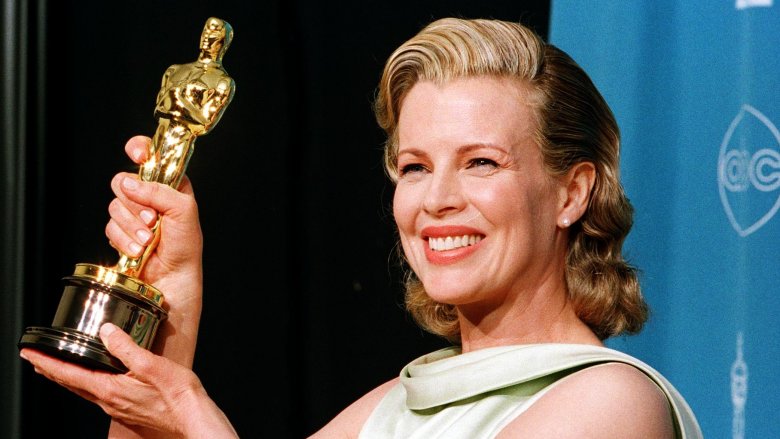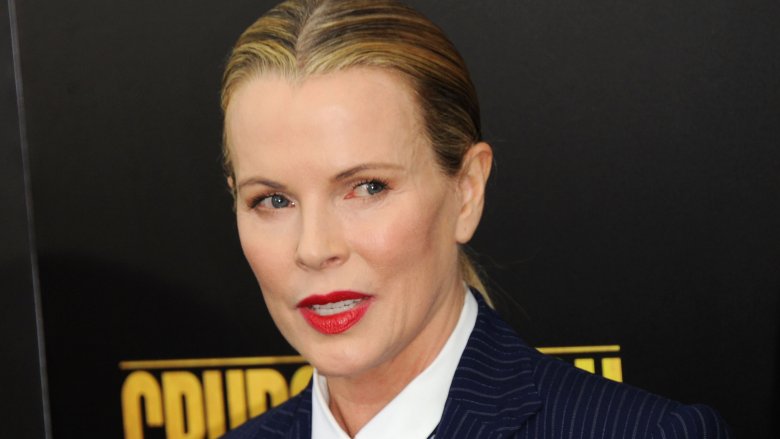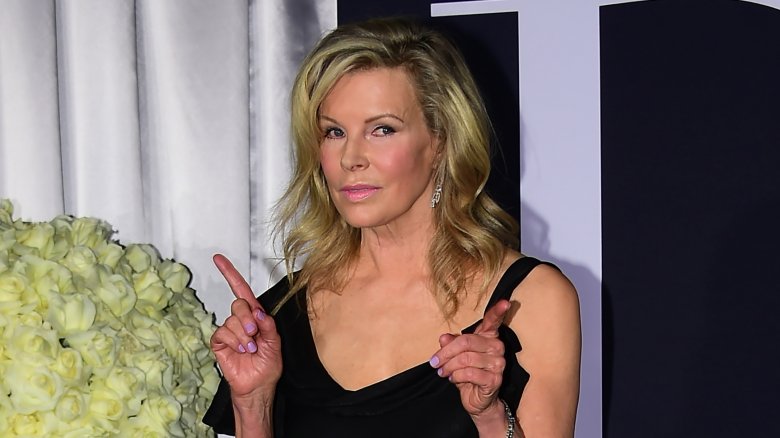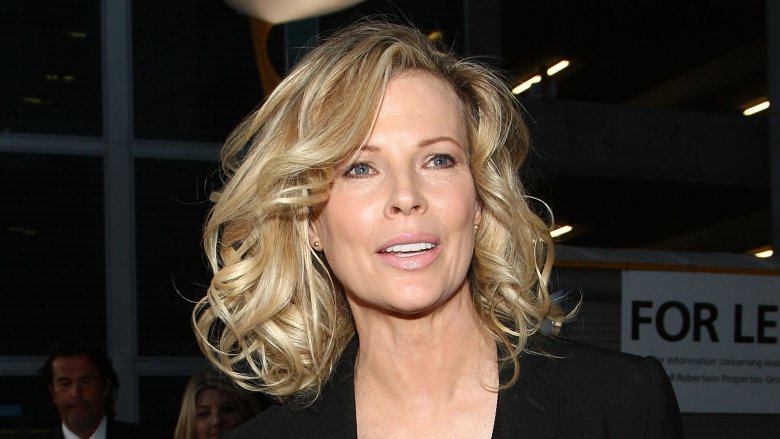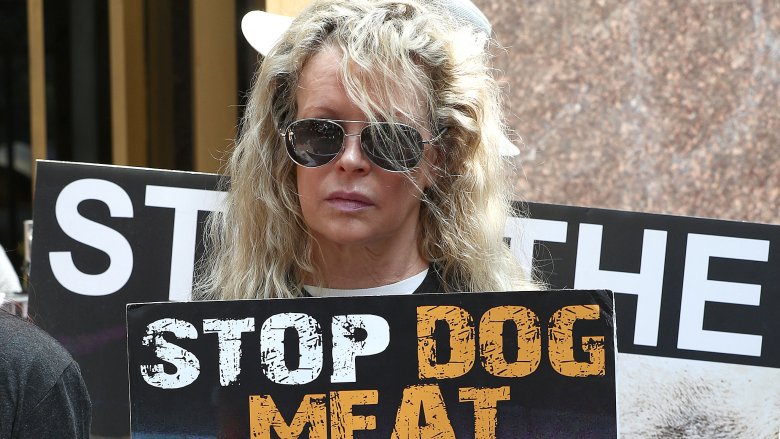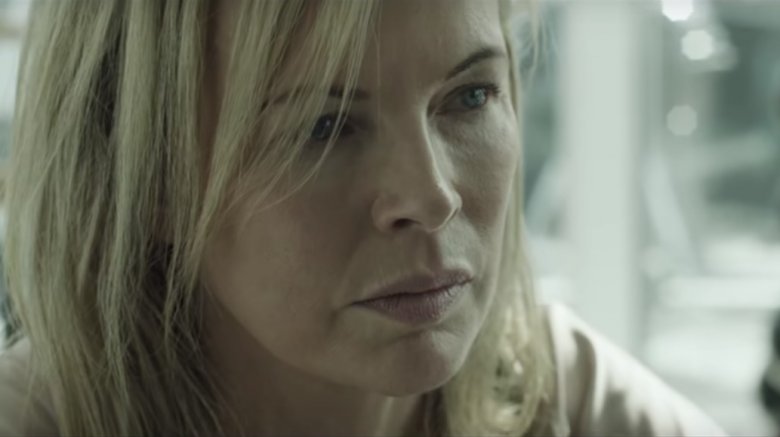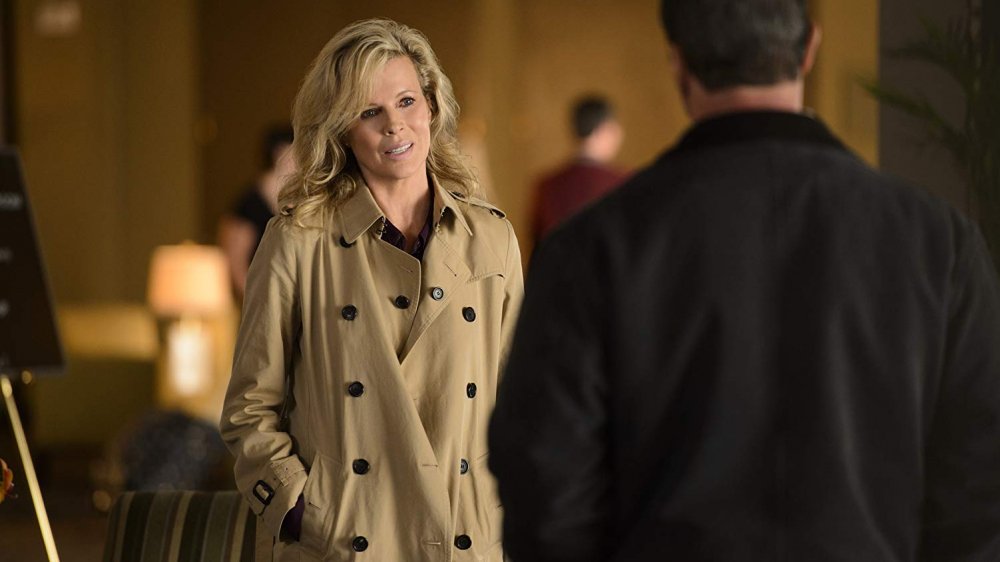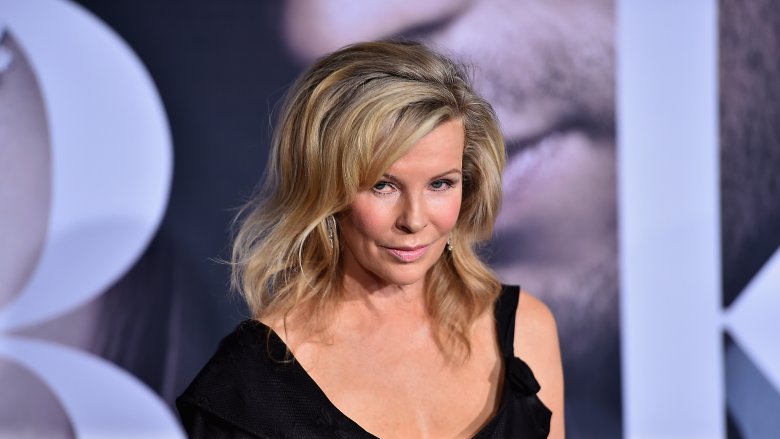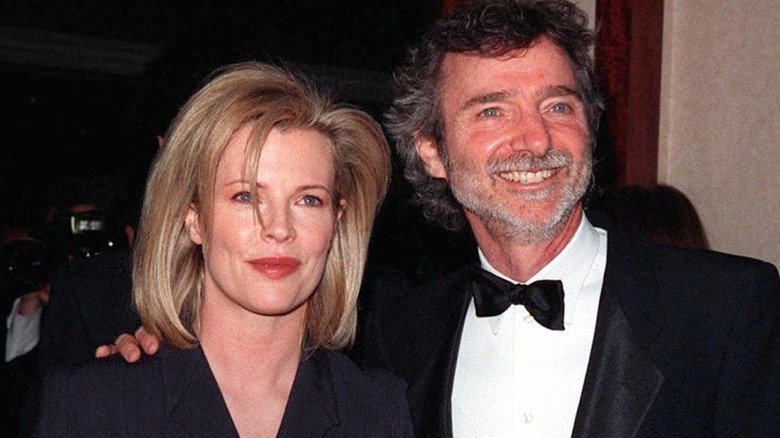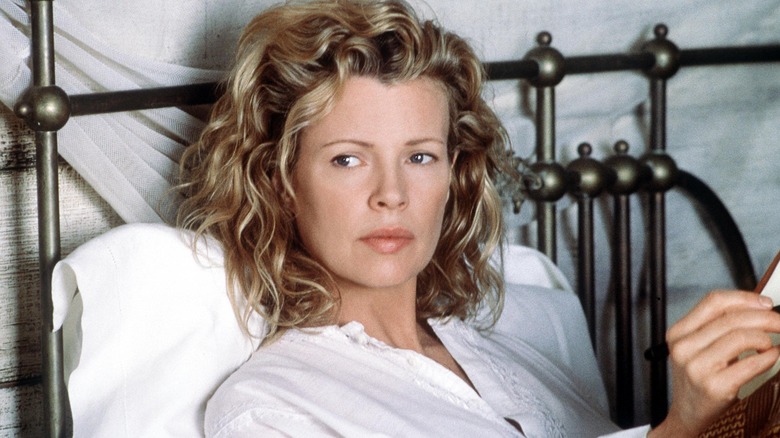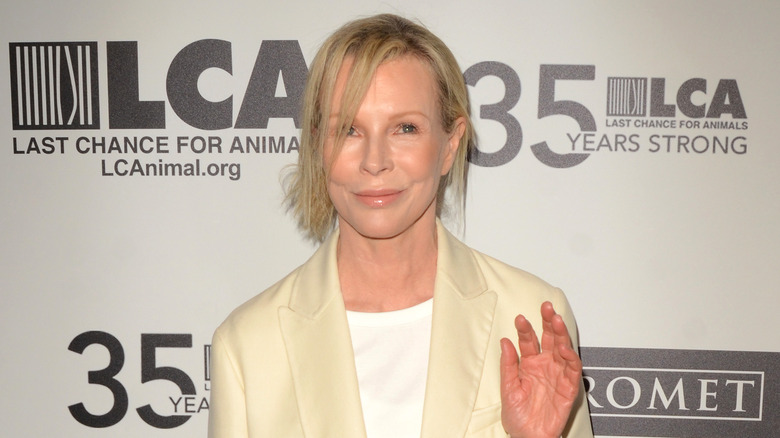Why Hollywood Won't Cast Kim Basinger Anymore
As the daughter of a jazz musician and a ballet dancer, Kim Basinger was destined for a career in the performing arts. At age 17, the Georgia native moved to New York City and started working as a model. She famously posed for Playboy in 1983, and that same year appeared opposite Sean Connery in the James Bond movie Never Say Never Again. Playing a Bond girl was only the beginning for Basinger — she became a full-fledged Hollywood sex symbol in the '80s and early '90s, pushing the boundaries of the era with movies like 9½ Weeks, an erotic drama in the same vein as Fifty Shades of Grey.
Of course, Basinger appeared in the Fifty Shades franchise many years later, portraying the woman who introduced kinky businessman Christian Grey to the world of BDSM when he was an impressionable teenager. 2017's Fifty Shades Darker remains Basinger's most recent feature film appearance. She popped up in critically acclaimed Amazon series Comrade Detective a few months later, but hasn't been seen on either the big or the small screen since. How did this Oscar-winning star manage to fall off the radar? Here's why Hollywood won't cast Kim Basinger anymore.
Her sex symbol status hurt her
It probably seemed like a great opportunity at the time, but agreeing to a full-frontal nude photoshoot with Playboy set Kim Basinger's career on a path that proved difficult to alter. Her position as a sex symbol was cemented when she played Domino Petachi in Never Say Never Again, and in the years that followed, she was typecast.
She made an effort to get out of her comfort zone with projects like the 1987 crime comedy Nadine, but the reviews weren't always kind, and Basinger came to realize that she couldn't generate any buzz without getting a little raunchy. She almost lost interest in making movies as a result, but director Curtis Hanson convinced her to play to her strengths. According to the Los Angeles Times (via GQ), Basinger was hesitant about taking on the part of prostitute Lynn Bracken in Hanson's neo-noir smash hit L.A. Confidential, which to this day remains her role of greatest acclaim.
"She started out as a sex symbol, and the powers that be in Hollywood couldn't see her as anything else," casting director Ed Johnston said. Basinger was convinced to put her reservations about the character aside and she ended up winning a Best Supporting Actress Oscar. It was a remarkable turnaround considering she had filed for bankruptcy just four years earlier after being sued by producers for backing out of the indie movie Boxing Helena.
Her passion project tanked hard
So what did Basinger do with her post-Oscar buzz? She hadn't been working much when Curtis Hanson (who passed away in 2016 at the age of 71) sought her out for L.A. Confidential, and despite the fact that the film was a hit, it would be a few years before she popped up again — when it became clear that she'd been pouring her time and energy into a passion project.
In 2000, Basinger's big-screen adaptation of Kuki Gallmann's memoir I Dreamed of Africa was released, the true story of a single mother who risked everything to move to Kenya with her son in pursuit of adventure and a new start. Making the movie on location was a life-changing experience (she told UrbanCinefile that she "cried for hours" when she had to leave Kenya), but the movie failed to resonate with critics.
Basinger breaks her leg in the opening moments of the movie, and the rest of it is "so dull you can almost hear the bone heal," AV Club's Keith Phipps said in his damning review. The vast majority of critics agreed with his assessment — I Dreamed of Africa has a pretty dire 10 percent rating on Rotten Tomatoes, criticized for failing to move or entertain. The whole thing cost $50 million to make, but it only managed to pull in $14 million at the worldwide box office.
She's sick of all the wife and mom roles
In 2002, Basinger portrayed the woman who cooked the spaghetti that Eminem nervously regurgitates in "Lose Yourself," the Oscar-winning song written for the rapper's semi-autobiographical movie debut, 8 Mile. Reuniting with director Curtis Hanson to play Eminem's mother was a good move for Basinger's career in some ways (her performance found "the right note somewhere between love and exasperation," veteran film critic Roger Ebert said), but it came with an unwanted side effect.
As the 2000s ticked on, Basinger realized that she'd been consigned to a brand new pigeonhole — the wife and/or mother. A number of high-profile actresses have spoken about rampant ageism in Hollywood when it comes to women, and Basinger has been on the receiving end of this disturbing trend for years.
Speaking to Elle, Basinger said that nobody would buy her as a mother at one stage, and then all of a sudden she was getting offered "every single mother role" that came up. "They'd say, 'Get her, she can play the mother.' Because people don't think outside the box very often. They're just not thinking beyond. There are always these roles of the mother, whether it's the young mother, the middle-aged mother, or the grandmother. Women are important, and they have to be in the movies."
She's too shy for the spotlight
According to Basinger, if you want to get ahead in Hollywood then you have to be willing to network, something she's admittedly terrible at. "After all the years I've been in Hollywood, I still don't know a lot of the directors and producers who are working today," she told Interview magazine in 1994. "I've never met them. I'm not a real social person. I'm shy, and a lot of the business is just social. It really is. I don't think it's a bad game, but early on I didn't know there was a game. I know now."
In 2016, she told Net-A-Porter that she had struggled with social anxiety for a number of years, which turned what should have been a joyous occasion into an uncomfortable one. "I'll do things that make other people nervous, like skydiving, and they don't bother me at all," Basinger said. "I was fascinated by the snakes we had on the set of I Dreamed of Africa, and I'll go swimming way out in the ocean, no problem. But accepting my Oscar for L.A. Confidential in 1997? That was terrifying."
Basinger was in her mid-20s when she had her first panic attack, a traumatic experience that stopped her career dead in its tracks for a while. "I stayed in my house and literally cried every day," she said (via Independent). "I didn't know what it was. I didn't know how to define it."
She still gets anxious today
It isn't quite as debilitating as it once was, but Basinger still has the odd onset of anxiety today, despite her decades of experience in the entertainment industry. Rubbing shoulders with Hollywood bigwigs has never been her style and clearly isn't something she relishes, but she's made a concerted effort to get over her social anxieties for the sake of her career — nobody wants to hire an actor who can't handle being around other people.
"I still get anxious sometimes, but I've worked very hard on it so it doesn't paralyze me like it did before," she told Net-A-Porter. "I've never taken medication for anxiety, so I've had to white-knuckle it a few times. I've found that it helps if I take the focus away from me — ironic for an actress, I know! That's why I love being a mom and advocating for animals: that's when I really feel powerful."
Motherhood has taken priority over Hollywood for Basinger ever since Ireland Basinger-Baldwin, her daughter with now ex-husband Alec Baldwin, was born in 1995. Model and social media influencer Ireland has had a difficult relationship with her father at times over the years (he famously left her a voicemail calling her a "thoughtless little pig" when she was just 11 years old), but she and Basinger are apparently like peas in a pod. The two were spotted doing a mother-daughter photoshoot on a Malibu beach in February 2018.
The industry has gotten 'out of hand'
During her candid interview with Net-A-Porter, Basinger bemoaned the state of the modern movie industry and explained why she just isn't cut out for it. She came into her own in a time before Twitter and Instagram, when famous people weren't expected to be constantly connected to the public through their phones, and Basinger much preferred it that way.
"Social media has changed everything," she said. "There was more mystery before, but now, people just show their butts all over the place. I've never been one to share much of my life. It's a shame how out of hand this industry has become, and where the value system has gone." Image is everything in Hollywood, and the older she gets, the more aware of that fact Basinger becomes. That doesn't mean she cares what anyone thinks of her, however, and that includes Hollywood.
"The best part of aging is learning to shed all the s*** that has weighed you down your whole life," the Batman star said. "People don't bother me so much. It's not my business what they think of me." Despite the raunchy roles that she seemed to slide into with ease in her early days, Basinger revealed that she was actually "more self-conscious" back when she was a Hollywood sex symbol at the top of her game. "I took stuff too seriously," she said. "If I could go back, I'd let rip more!"
She's seen 'the underbelly' of Hollywood
The issue of equality was thrust to the forefront of the conversation in Hollywood when the Harvey Weinstein scandal broke in 2017, and it's since become clear that the problem isn't a new one. She hasn't come forward with any specific stories of sexual misconduct in the workplace, but Basinger has been around long enough to have seen the dark side of the business at work, and she hinted at that during her 2016 interview with Net-A-Porter. "It would be great if we could have full equality, for all races and genders — not just in Hollywood, everywhere — but I don't think we'll get there," she said. "People think of Hollywood as this very liberal place, but if you look at the underbelly, the discoveries you'll make are mind-boggling."
Basinger has proposed a radical remedy to the problem, suggesting that women should point blank refuse to reproduce until meaningful changes are made. She told The Blot that "everyone has had a brush" with sexism in her line of work, and that women across the world needed to present a united front on gender equality. "If we women all stood up and held hands and just said 'No' to men... women would find out just how much power they really have," Basinger said. When she spoke to Elle, she once again suggested that female celibacy would lead to female domination. "We can stop having babies, we can stop having sex, everything," she said. "And then women will rule the world."
Animal activism
As a passionate animal rights activist, Basinger isn't afraid to call people out over the mistreatment of animals, which she sees as a global problem. "The bad thing about animal protection is it never seems to get better," Basinger told Samaritan Mag in August 2018. "It's an ongoing fight to protect any kind of animal." She gave the interview in the hope of raising awareness about the inhumane dog meat trade that remains rife in parts of Asia, though she's also been known to take issue with animal abuses happening at home in the States.
At times, Basinger's image has actually suffered as a result of her well-intentioned actions. Her behavior was dubbed "radical chic" by doubters after she campaigned to stop horse-drawn carriages operating in New York. "It's not all that radical," she said in her defense, telling Interview that she witnessed a horse collapse from heat exhaustion not long after arriving in NYC as a teenager. "I just feel passionately about the horses and I will until it's no longer a tradition in New York. Time should change traditions."
Hollywood has a checkered past when it comes to the use of animals in movies, and even though it's likely against her moral code today, Basinger herself was once guilty of the practice. She was called a hypocrite after it emerged that circus elephants were used during the making of I Dreamed of Africa.
Her comeback vehicle crashed and burned
In 2015, Basinger brought another long hiatus to an end with The 11th Hour, a bizarre horror film from Danish director Anders Morgenthaler. Starring Basinger as a successful businesswoman sinking into insanity after suffering eight miscarriages in two years, the low-budget release was dubbed "a creepy, pretentious hunk of junk" by Observer's Rex Reed, one of many critics who gave The 11th Hour a scathing review.
"If Kim Basinger still knows how to act, there is no evidence of it here," Reed wrote. "Whatever she remembers about character development, facial expressions or anything resembling how to deliver a convincing line reading she's not sharing with anybody." The film ended up with a telling 13 percent rating on Rotten Tomatoes after all the top critics picked it apart. "Overwrought, underwritten and pure cynicism," Katherine Pushkar wrote for the New York Daily News.
Speaking to the Daily Beast, Basinger said that The 11th Hour was supposed to be "a metaphor for businesswomen and making choices in life, because today, many professional women choose not to have families, and all of a sudden they wake up and they want that." According to Film Journal International critic Simi Horwitz, on the other hand, "The 11th Hour will be virtually meaningless — in fact, downright ludicrous — to any woman who has never had a burning desire to have a child." As a comeback vehicle this so-called "fertility thriller" was a disaster for Basinger, who hasn't appeared in a leading role since.
She had a bad experience making Grudge Match
In 2018, Kim Basinger sat down with Interview to look back on the in-depth chat she'd had with the magazine almost two and half decades earlier, and she was asked to review the answers she'd given in 1994 to see if she still felt the same way. For the most part, her opinions hadn't changed. There was one question that she gave a starkly different answer to, however: She claimed that she'd never had a bad experience making a movie during her initial interview, but Basinger revealed that this was no longer the case — she admitted that she had a terrible time making 2013's Grudge Match.
The boxing comedy, which stars Sylvester Stallone and Robert De Niro as past-their-prime rivals who get drawn out of retirement for one last showdown, didn't go over well with the majority of critics. Basinger (who plays Stallone's ex-girlfriend) neglected to go into detail about what made the experience such a bad one, though some leaked set photos from the time appeared to show her arguing with Sly as they filmed a scene in a New Orleans park. It's possible that the two were simply in character, but the way it was reported made it seem as though they were clashing for real. Basinger was still trying to rebuild her reputation at the time, and regardless of whether it was true, the story was likely a setback for her.
Overcoming challenges
So what's next for Kim Basinger? Does she have another passion project up her sleeve? Right now, her passion is fighting for the rights of animals, although she openly admits that it's often an uphill struggle. "There's so many things," she told Samaritan Mag. "The wild animals in the poaching situation. I'm working on something 24/7 with the Humane Society."
What about regrets? Turns out she has none whatsoever, as Basinger explained to the Georgian Journal. "We all have our challenges, our ups, our downs, our wins and losses, our successes and our failures, but each and every one of us has a journey," she said. "Through the years I have learned to truly embrace my journey and to be thankful for everything I've ever gone through, whether truly positive or trying to get through a tough situation. I just feel I am a student of life, I've learned much, and I will be learning until I leave this planet."
Hopefully she won't be leaving this planet any time soon, as Basinger is a force for good in Hollywood and beyond. Sadly, being outspoken doesn't always help a career in the movies run smoothly, and her days as a big-name star may well be over. Not that she cares. "I truly have no regrets," she insists. "I try to live every day in the present, not having one foot in the future or one foot in the past."
Her champion director died
For a person to get a boost in any business, including the movie industry, it involves a respected and powerful insider taking notice and making a stand on their behalf. For Kim Basinger, no longer the name-above-the-marquee superstar she'd been marketed as in the late '80s and early '90s, it took the attention and enthusiastic advocacy of auteur filmmaker Curtis Hanson to help her stage one of the biggest comebacks and critical reconsiderations in modern movie history.
After back-to-back commercial duds "The Getaway" and "Ready to Wear" in 1994, Basinger didn't take on any movie roles for years. Then Hanson, director of "The Hand that Rocks the Cradle" and "The River Wild," cast Basinger as the femme fatale/bombshell-type Lynn Bracken in his adaptation of James Ellroy's 1950s-set noir novel "L.A. Confidential." Basinger earned rave reviews for her performance, racking up numerous guild and critics' association honors on the way to winning the Academy Award for Best Supporting Actress. In 2002, Hanson would again seek out Basinger's acting services, giving her the plum role of Stephanie Smith, the troubled mother of the aspiring rapper played by Eminem in the loosely biographical and widely acclaimed "8 Mile."
The close and fruitful working relationship between Basinger and Hanson wouldn't last, however. Hanson only made three more theatrical films after "8 Mile," and he died in 2016. "I just felt like I was in the hands of someone incredibly special," Basinger said in her tribute to the filmmaker (via The Hollywood Reporter). "Few actors get to have somebody who truly, truly, truly believes in them. Sometimes I would look at him and say, 'Really, really, do you think I can do it?' I was his go-to girl sometimes, and I feel very, very blessed."
Hollywood doesn't think she's very good at acting
Kim Basinger won an Academy Award for "L.A. Confidential," but that film could be considered an aberration on her acting resume. Basinger's work is largely devoid of major awards and praise. Apart from many notices for "L.A. Confidential," Basinger earned a Golden Globe nomination in 1984 for "The Natural," a Boston Society of Film Critics Awards nomination for "The Door in the Floor," and an AARP Movies for Grownups prize for "The Burning Plain." But among the circles that ironically celebrate and savagely mock movies and acting performances deemed terrible or sub-par, Basinger is a big name and a prime, perpetual target.
Basinger won the 1993 Yoga Award for Worst Foreign Actress for "Final Analysis," was nominated three times by the Stinkers Bad Movie Awards for "Bless the Child," "I Dreamed of Africa," and "The Getaway," and holds the dubious distinction of being one of the most recognized performers ever at the Golden Raspberry Awards, popularly known as the Razzies. Basinger received nominations for Worst Actress for "Nine 1/2 Weeks," "The Marrying Man," "Final Analysis," "Cool World," "The Getaway," "I Dreamed of Africa," and "Bless the Child," before taking home Worst Supporting Actress in 2018 for "Fifty Shades Darker."
Despite the fact that she has an Oscar at home, filmmakers just might still believe that Basinger isn't a very good actor — or at least not one they're willing to place at the center of massive, prestigious, artful productions.
Her recent movies have all flopped
Poor critical assessment can only go so far in determining an actor's future work prospects. Moviemaking is a business, after all, and if a performer absolutely loathed by film writers and awards bodies is still earning a lot of money with their work, that negativity doesn't matter at all. Kim Basinger, whose work has almost never earned praise from critics, built a storied career because so many of her movies turned into big-time box office hits. But once they stopped bringing in the cash, big Hollywood producers simply didn't want to work with her much anymore.
After the success of "8 Mile" in 2002, Basinger headlined the audience-averse, barely noticed films "People I Know," "The Door in the Floor," "Even Money," "While She Was Out," "The Informers," "The Burning Plain," "Charlie St. Cloud," "Third Person," and "Black November." If you've seen (or even heard of) any of these movies, you're in the minority. The only films from this period of her career that could be classed as moderate hits are "The Sentinel," "Grudge Match," and "The Nice Guys," though none of them cracked the $100 million mark. The latter film is Certified Fresh on Rotten Tomatoes, but the other two were huge splats, earning scores of 35% and 31%, respectively.
